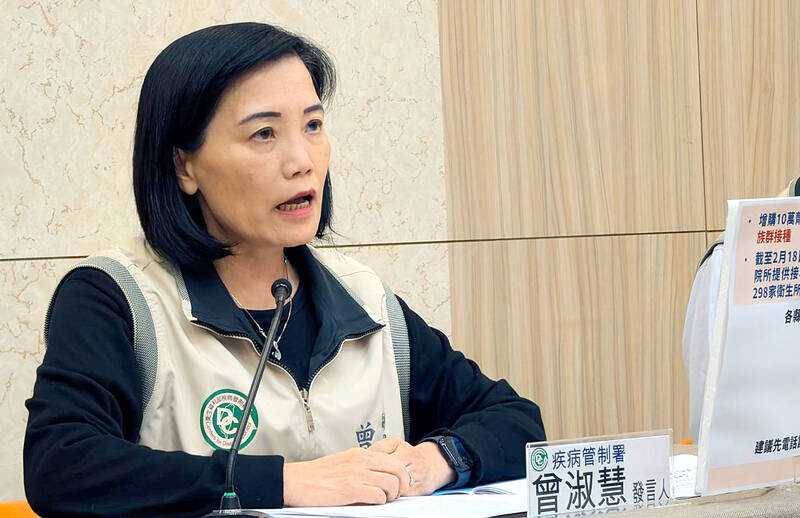The JN.1-adapted COVID-19 vaccines for children aged six months to 11 years have been used up, so starting from yesterday, eligible children would receive half a dose of the adult vaccine — equal to the children’s vaccine dosage, the Centers for Disease Control (CDC) said.
Fourteen hospitalized COVID-19 cases and one death were reported last week, and none of them had received the latest JN.1-adapted vaccine, CDC Epidemic Intelligence Center Director Guo Hung-wei (郭宏偉) said on Tuesday.
Since Sept. 1 last year, 502 people have been hospitalized for COVID-19 and 106 deaths have been reported, he said.

Photo: CNA
Of those who were hospitalized after Oct. 1, more than 97 percent did not stay up to date with their vaccine, he added.
The government had purchased 5 million Moderna JN.1 jabs for adults and 500,000 doses for children, but the latter have been used up, CDC Deputy Director-General Tseng Shu-hui (曾淑慧) said.
The Moderna JN.1 vaccine for adults is a single-dose prefilled 0.5ml syringe, and the children’s is 0.25ml, she said.
Following the depletion of vaccines for children, the Advisory Committee on Immunization Practices recommended using half a dose of adult vaccine for children, starting yesterday, Tseng said.
Children have frequent and close contact with others at nurseries and schools, and they are exposed to a higher risk of clustered infection, so the CDC recommends parents get their children vaccinated for better protection against COVID-19, she said.
Unvaccinated children aged six months to younger than five years are advised to get two doses of the JN.1 vaccine at least four weeks apart, and if they have previously received any COVID-19 vaccines, they are advised to get a dose of the JN.1 vaccine at least 12 weeks after the most recent dose, the CDC said.
Meanwhile, international media have reported that researchers at China’s Wuhan Institute of Virology have identified a new coronavirus in bats — HKU5-CoV — that can enter human cells through the same pathway as the SARS-CoV-2 virus, Tseng said.
Although, there have been some concerns about the possibility of the new coronavirus leading to a mass outbreak, the HKU5-CoV has so far only been detected in laboratory studies and has not been found in humans, so whether it is truly zoonotic or can transmit from human to human still needs further research, she said.
The coronaviruses that have caused mass outbreaks, including MERS-CoV and SARS-CoV-1, have characteristics such as the ability to infect human cells, to replicate in the human body, to transmit from person to person and pathogenicity, she said.
HKU5-CoV is unlikely to cause a public health threat, but the CDC would continue to pay attention and assess the risks, she added.

The Ministry of Economic Affairs has fined Taobao NT$1.2 million (US$36,912) for advertisements that exceed its approved business scope, requiring the Chinese e-commerce platform to make corrections in the first half of this year or its license may be revoked. Lawmakers have called for stricter enforcement of Chinese e-commerce platforms and measures to prevent China from laundering its goods through Taiwan in response to US President Donald Trump’s heavy tariffs on China. The Legislative Yuan’s Finance Committee met today to discuss policies to prevent China from dumping goods in Taiwan, inviting government agencies to report. Democratic Progressive Party Legislator Kuo Kuo-wen (郭國文) said

The Ministry of Economic Affairs has fined Taobao NT$1.2 million (US$36,900) for advertisements that exceeded its approved business scope and ordered the Chinese e-commerce platform to make corrections in the first half of this year or its license would be revoked. Lawmakers have called for stricter supervision of Chinese e-commerce platforms and more stringent measures to prevent China from laundering its goods through Taiwan as US President Donald Trump’s administration cracks down on origin laundering. The legislature’s Finance Committee yesterday met to discuss policies to prevent China from dumping goods in Taiwan, inviting government agencies to report on the matter. Democratic Progressive Party

Taiwan and its Pacific ally Tuvalu on Tuesday signed two accords aimed at facilitating bilateral cooperation on labor affairs, according to Taiwan’s Ministry of Foreign Affairs (MOFA). The governments inked two agreements in Taipei, witnessed by Foreign Minister Lin Chia-lung (林佳龍) and visiting Deputy Tuvaluan Prime Minister Panapasi Nelesone, MOFA said in a news release. According to MOFA, the agreements will facilitate cooperation on labor issues and allow the two sides to mutually recognize seafarers’ certificates and related training. Taiwan would also continue to collaborate with Tuvalu across various fields to promote economic prosperity as well as the well-being of their

Sung Chien-liang (宋建樑), who led efforts to recall Democratic Progressive Party (DPP) Legislator Lee Kun-cheng (李坤城), was released on bail of NT$80,000 today amid outcry over his decision to wear a Nazi armband to questioning the night before. Sung arrived at the New Taipei District Prosecutors’ Office for questioning in a recall petition forgery case last night wearing a red armband bearing a swastika, carrying a copy of Adolf Hitler’s Mein Kampf and giving a Nazi salute. Sung left the building at 1:15am without the armband and covering the book with his coat. Lee said today that this is a serious